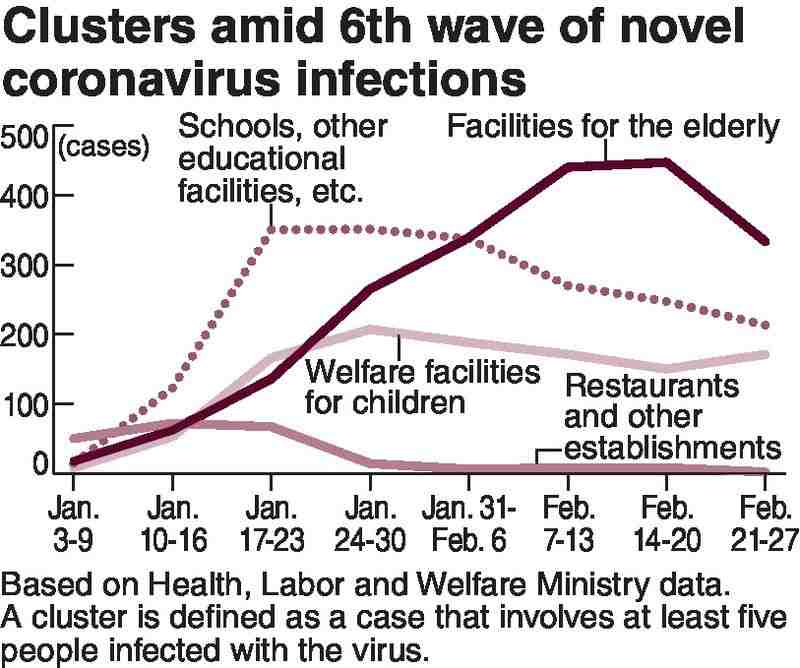
16:53 JST, March 6, 2022
Some prefectural governors and experts have voiced concerns over the effectiveness of quasi-emergency priority measures that require restaurants to shorten their operating hours, as such eateries are no longer the main source of novel coronavirus clusters.
Against extension
“Continuing to require restaurants and other establishments to shorten their operating hours will be less effective,” Fumio Otake, a specially appointed professor of economics at Osaka University, said at a meeting of the government’s coronavirus subcommittee on Friday.
The meeting was held to discuss whether to extend or lift quasi-emergency priority measures, which have been in place in Tokyo and 30 prefectures. Otake opposed the extension, mainly due to the small number of clusters originating in restaurants and other dining establishments.
Amid the sixth wave of infections, which has been dominated by the omicron variant, the virus spread explosively among people who dined together for the year-end and New Year’s holidays. The main scene of infections has since shifted to home environments, schools and facilities for the elderly.
“We should concentrate on measures to prevent the elderly from becoming severely ill,” Otake said, stressing that the highly contagious omicron variant is difficult to control, but that risk of becoming severely ill from it is lower than with other existing variants.
At eateries, the younger generations in particular dine with people whom they do not regularly see, people from outside their homes and workplaces, making it easier for infections to spread quickly. Therefore, regulations such as shorter operating hours are believed to be more effective when they are put in place earlier in a wave of infections.
“The priority measures helped put a brake on the spread of infection in the initial stage,” said Fukuoka Gov. Seitaro Hattori. “But the setting of infections has shifted, so the priority measures are unlikely to have a significant effect on reducing the spread of the virus from now on.”
For that reason, Hattori requested the lifting of the priority measures on Sunday as initially scheduled. The governor will ask restaurants and other establishments in Fukuoka Prefecture to have no more than four people per table for a maximum of two hours, thereby pursuing infection countermeasures and economic activities simultaneously.
Equitable treatment
Regardless of whether priority measures were in place, the number of people going to entertainment districts at night has decreased since early January, when infections were spreading rapidly.
In Miyagi Prefecture, Miyagi Gov. Yoshihiro Murai remains consistent in not requesting priority measures amid the current wave of infections. However, some restaurants have called for them after experiencing a decrease in the number of customers, because business operators can receive money for their cooperation in complying with requests for shorter business hours.
“It makes no sense to apply priority measures for the sake of cooperation money,” said Murai.
The governor has emphasized that economic measures should target a wide range of industries hit by the pandemic and has therefore implemented a support program different from other prefectures.
In Tottori Prefecture, where priority measures are also not in place, infection countermeasures have been further strengthened particularly for schools and daycare centers, which are currently at the center of infections. The measures include calling for elementary schools and daycare centers to close if they have infections and distributing masks for children to all daycare centers and kindergartens.
“We’ve taken reasonable measures to curb infections,” said Tottori Gov. Shinji Hirai.
Regional characteristics
Subcommittee leader Shigeru Omi said Friday that urban and regional areas have “different tones” regarding their measures for restaurants and other eateries.
Central Tokyo is densely populated, and entertainment districts attract large numbers of the general public. However, public health centers’ huge workload may prevent them from fully ascertaining the infection situation of restaurants and other eateries.
“Curbing the flow of people into entertainment districts at night will remain the key to infection control measures,” said a Tokyo metropolitan government official.
“Requesting restaurants to shorten opening hours has a certain impact in stopping infections from spreading from such places,” said Atsuo Hamada, a specially appointed professor of infectious diseases at Tokyo Medical University Hospital. “However, if people aren’t told about the necessity of such regulations in an easy-to-understand way, they won’t change how they behave, and these measures may not be fully effective.”
Top Articles in Society
-

Man Infected with Measles Reportedly Dined at Restaurant in Tokyo Station
-

Man Infected with Measles May Have Come in Contact with Many People in Tokyo, Went to Store, Restaurant Around When Symptoms Emerged
-

Woman with Measles Visited Hospital in Tokyo Multiple Times Before Being Diagnosed with Disease
-

Australian Woman Dies After Mishap on Ski Lift in Nagano Prefecture
-

Foreign Snowboarder in Serious Condition After Hanging in Midair from Chairlift in Nagano Prefecture
JN ACCESS RANKING
-

Japan PM Takaichi’s Cabinet Resigns en Masse
-

Japan Institute to Use Domestic Commercial Optical Lattice Clock to Set Japan Standard Time
-

Israeli Ambassador to Japan Speaks about Japan’s Role in the Reconstruction of Gaza
-

Man Infected with Measles Reportedly Dined at Restaurant in Tokyo Station
-

Videos Plagiarized, Reposted with False Subtitles Claiming ‘Ryukyu Belongs to China’; Anti-China False Information Also Posted in Japan























